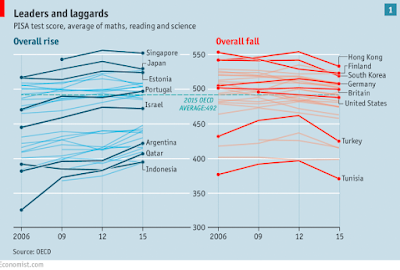The Economist has a summary of the sixth round of PISA rankings of 15 year olds from 2015 here. Singapore tops in all the three subjects - Math, Reading, and Science - and Qatar, Argentina, and Israel have seen the biggest rise since 2006.
Interestingly, beyond a certain level, possibly necessary to assure minimum facilities, additional spending does not lead to any increase in outcomes. To this extent, Russia, Poland, and Estonia have the most efficient school systems.
Finally, at a time when non-profits like Pratham are promoting Teaching at Right Level (TaRL) by grouping children by ability within schools, PISA results, atleast in Science, appear to indicate that this is associated with decrease in scores. Granted the different dynamics associated with such grouping in better school systems compared to the very poor ones, it is still worth keeping in mind while we pursue TaRL. Interestingly, in contrast, the use of adaptive instruction is associated with a significant increase in learning outcomes, equivalent to an additional one-third of a year of instruction.
The results find that while public school children fare worse than private school kids in science, this difference disappears once their economic and social backgrounds are accounted for.
And for countries like India which are intensely promoting vocational education, a note of caution comes from the finding that it is associated with a widening of the gap between the learning outcomes of rich and poorer children. Another note of caution should be on the efforts to restore the practice of detentions - school systems that follow such policy are associated with a decrease in score by 50, equivalent to more than one-and-half years of schooling.
This year, the PISA authorities have generated a model that explains 85% of the variations in scores across countries. The Times has this summary of the model,
Generally speaking, the smartest countries tend to be those that have acted to make teaching more prestigious and selective; directed more resources to their neediest children; enrolled most children in high-quality preschools; helped schools establish cultures of constant improvement; and applied rigorous, consistent standards across all classrooms.



2 comments:
"The results find that while public school children fare worse than private school kids in science, this difference disappears once their economic and social backgrounds are accounted for."
Prof. Karthik Muralidharan has done a valuable study on this issue. http://www.livemint.com/Opinion/t9oSpg4VnEgK6yKx3tmAXM/A-renewed-model-of-education.html
As far as adaptive learning goes, I am aware of its efficacy but feel that policymakers are putting the cart before the horse by crazily pushing tablets, laptops etc. in classrooms, without providing the supporting infrastructure. I don't think even 5% of the teachers in govt schools would be comfortable with using these gadgets, let alone the students.
Agree with your comment on private schools. Adaptive learning has not been tried out in public schools anywhere in India (in any meaningful scale). The likes of Mindspark are being used only in private schools.
The previous experience of IT systems use ins schools, which you rightly caution against, should serve as reminders about the challenges and help design interventions in AL.
Post a Comment